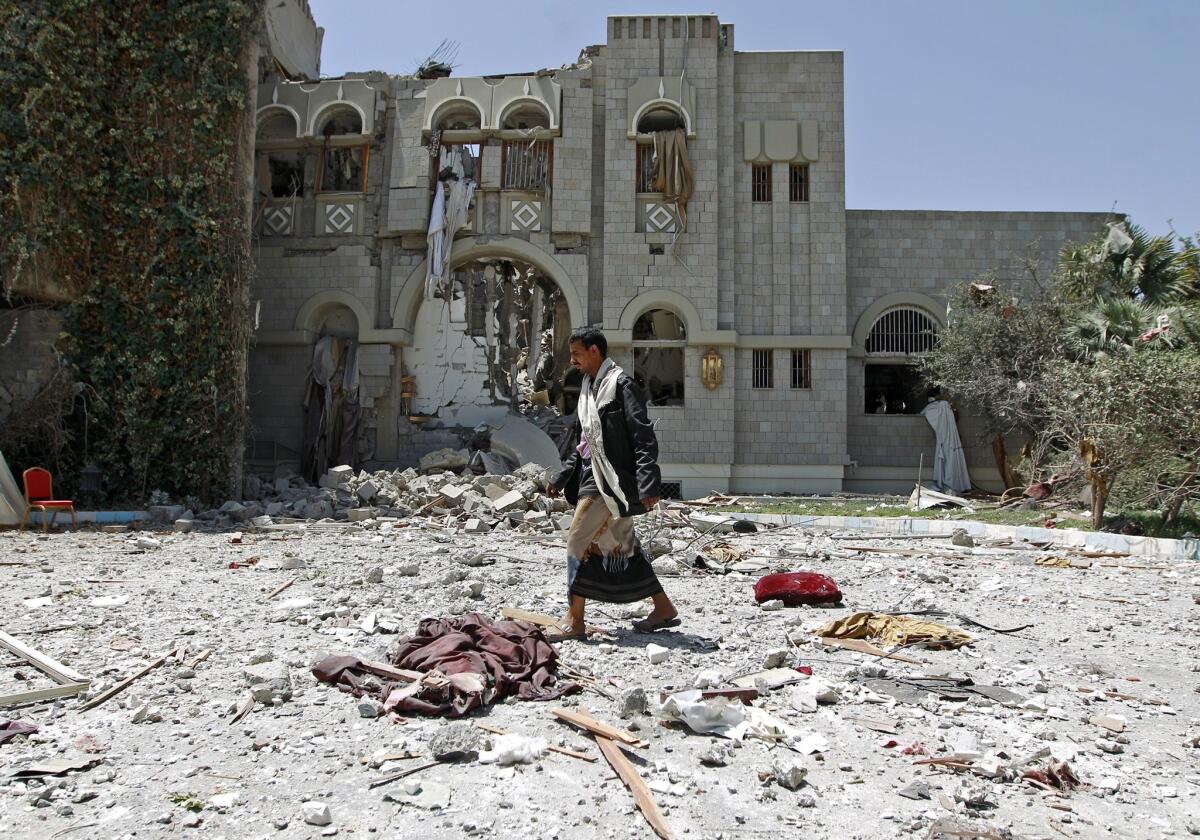Yemen rebels agree to cease-fire; Saudi airstrike hits ex-leader’s home

A gunman loyal to former Yemeni President Ali Abdullah Saleh walks amid the wreckage of Saleh’s residence following airstrikes Sunday.
- Share via
reporting from Sana, Yemen — Yemen’s Houthi rebels said Sunday they would accept a five-day humanitarian cease-fire proposed by Saudi Arabia, even as a new round of Saudi airstrikes targeted the home of former President Ali Abdullah Saleh, a key Houthi supporter.
An irate Saleh, a onetime Saudi ally, denounced the “cowardly” attacks and for the first time publicly declared his allegiance to Ansar Allah, as the Houthis are formally known.
------------
FOR THE RECORD
An earlier version of this post identified Yemen’s former president as Ali Abullah Saleh. He is Ali Abdullah Saleh.
------------
Statements from various Houthi leaders and their military allies in Yemen indicated that the rebel group would cooperate with the proposed cease-fire, which is scheduled to begin Tuesday. Saudi officials proposed the cease-fire last week.
But it still remained unclear how the truce would take hold in the war-ravaged nation, where fighting involving various armed factions is raging along multiple fronts as Saudi-led airstrikes have caused massive damage and loss of life.
Both sides in the conflict have warned that any violations of the planned cease-fire would bring renewed attacks.
United Nations aid officials have been calling for a pause in hostilities to help ease the suffering of civilians in the Arab world’s poorest nation, wracked by shortages of food, fuel and medicine since the Saudi-led bombing campaign began on March 26.
Saudi Arabia, whose leadership views neighboring Yemen as part of its sphere of influence, says its bombardment is meant to restore the internationally backed government of ousted President Abd-Rabbu Mansour Hadi, who is now in exile in Saudi Arabia. The Obama administration has supported the Saudi aerial campaign.
The Houthi rebels, who had placed Hadi under house arrest before he fled the country, accuse Riyadh of working with Al Qaeda gunmen and other militias in a bid to dominate Yemen.
Saudi officials view the Houthis as a proxy for Iran, Riyadh’s major regional rival for influence in the region. The Houthis say their alliance with Iran is political and not military.
Former president Saleh, who was apparently not at home when his residence in Sana was bombed, denounced the attacks as “barbaric aggression” and declared his support for the Houthis, whose rise to power sparked the 6-week-old Saudi air campaign.
“I can call this aggression to be cowardly,” Saleh said in an interview with a Yemeni broadcaster, directing his comments at Saudi leaders. “As for attacking with rockets and planes, you won’t achieve any of the goals you desire.”
It was widely known that Saleh and military units loyal to him had sided with the Houthis, whose forces seized Sana, the capital, last September, and later expanded their control elsewhere in the nation. But this appears to be the first time that Saleh has publicly declared his allegiance to the Houthis.
Saleh is a onetime Saudi and U.S. partner who ruled the nation for three decades before being ousted as a result of Arab Spring protests that broke out in 2011. His critics say Saleh is scheming to return to power.
The ex-president denounced the Saudi-led air campaign as “a war of extermination, a war of vengeance and hatred against the Yemeni people.”
In recent days, the Saudi-led coalition has stepped up its bombardment, pummeling Houthi strongholds in the north. The Houthis say scores of civilians have been killed. The latest round of attacks came after pro-Houthi forces shelled a Saudi border town, causing several casualties and sparking outrage in Saudi Arabia.
The United Nations says more than 1,400 people have been killed and some 6,000 injured in Yemen since the conflict escalated in March, while more than 300,000 people have fled the war-torn Persian Gulf nation.
Special correspondent Al-Alayaa reported from Sana and Times staff writer McDonnell from Istanbul, Turkey. Special correspondent Nabih Bulos contributed to this report from Gaziantep, Turkey.
Follow @mdcneville for news from the Middle East
More to Read
Sign up for Essential California
The most important California stories and recommendations in your inbox every morning.
You may occasionally receive promotional content from the Los Angeles Times.









